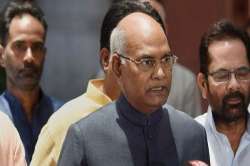President Kovind to pay 3-day visit to Vietnam from Sunday
"We are looking at further bolstering the time-tested relationship between the two strategic partners," the envoy told reporters.

President Ram Nath Kovind will pay a three-day visit to Vietnam beginning Sunday with a focus on deepening bilateral cooperation in key areas of defence and security, trade and in offshore oil exploration.
Sharing details of the visit, Vietnamese Ambassador Pham Sanh Chau said Kovind will address Vietnam's national assembly, and will become the second foreign leader to achieve the rare honour after Chinese President Xi Jinping.
"We are looking at further bolstering the time-tested relationship between the two strategic partners," the envoy told reporters.
Kovind's visit comes less than a month after Communist Party General Secretary Nguyen Phu Trong became the country's new president following the death of incumbent president Tran Dai Quang.
Trong became the first leader to hold both the powerful posts since founding father Ho Chi Minh in the 1960s.
Chau said both sides will aim to bolster cooperation in a number of sectors including defence and security, trade and investment, education, artificial intelligence, culture and tourism.
He said a number of issues including India's offshore oil exploration in Vietnamese waters as well as defence cooperation may figure in the talks.
Asked whether Vietnam was eyeing to procure Brahmos and Aakash missile systems from India, he did not give a direct reply but said "discussions are underway" between parties concerned on military purchases.
The envoy said Vietnam was procuring 11 high-speed patrol vessels from India out of which five will be produced in India and six will be manufactured in Vietnam.
He also said cooperation among the navies and air forces of the two countries are on an upswing and there was scope for further enhancing the defence ties.
The issue of the South China Sea, where China has been showing increasing assertiveness, is likely to be discussed during Kovind's visit.
On trade ties, Chau said the current volume of bilateral trade was USD 8.5 billion and it can increase significantly if the Regional Comprehensive Economic Partnership or RCEP comes into force.
"There is huge potential for trade to grow further," he said.
Under RCEP, a grouping of 16 leading countries are trying create one of the largest regional trading bloc globally through an ambitious trade deal.
The RCEP, comprising 10-member ASEAN bloc and six other countries -- India, China, Japan, South Korea, Australia and New Zealand, is engaged in negotiations for a free trade pact.